Is China’s Foreign Policy ‘Good Enough’?
The following article is a chapter in a forthcoming book compilation published by Friends of Socialist China entitled "China Changes Everything"
The question in the title may seem hyperbolic, but it is one that comes up in one form or another across the U.S. political spectrum.
U.S. elites slam China’s foreign policy as riddled with “debt traps” for poorer countries in the Global South. The Western corporate media asserts that China is pursuing its own kind of empire and has a target on its own p…


